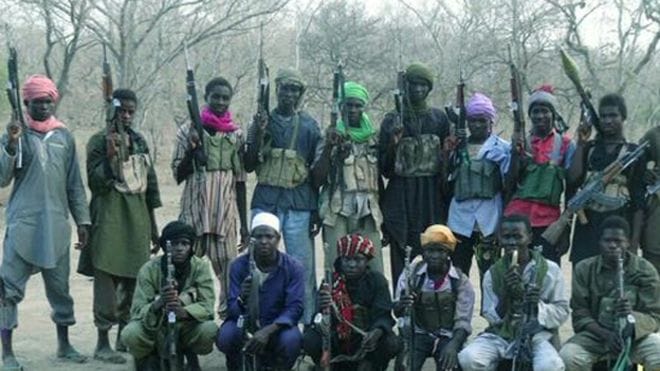With a number of photographs (pictured) and a new video released this week, Iraqi and Syrian terrorist group Islamic State (IS, pictured below) praises fellow Nigerian Islamic militant group Boko Haram, underscoring their growing partnership, according to the BBC.
RELATED: Nigerians Remember Missing Chibok Girls in One-Year Anniversary Ceremony
Ever since the Multinational Joint Taskforce (comprised of Chad, Cameroon, Benin, and Nigeria) came together to fight Boko Haram on March 1st, headlines have abounded about retaken territories and a large number of casualties sustained on the terrorist’s side.
In the midst of a number of major losses, Boko Haram leader Abubaker Shekau pledged allegiance to IS, confirming long-held suspicions that the two destructive entities are working in concert.
At the time, IS spokesman Mohammed al-Adnani said, “We announce to you to the good news of the expansion of the caliphate to West Africa because the caliph… has accepted the allegiance of our brothers of the Sunni group for preaching and the jihad.”
And this week, IS released a number of photos of Boko Haram via social media and referred to the militants as “Islamic State’s West Africa Province” (ISWAP).
This is the first time Boko Haram has been shown without face masks.
In the video, IS also refers to the Boko Haram fighters who have been killed in battle as “martyrs.”
According to BBC Africa Security Correspondent Tomi Oladipo, this growing alliance — in addition to the fact that most of Boko Haram has ventured deep in to the Sambisa forest — doesn’t bode well for government forces.
“…Nigerian troops are already encountering a mine-infested forest, slowing down their offensive against the group.
“It is likely that Boko Haram fighters understand the terrain of this expansive and largely dense forest better than the military does.
“So the Nigerian military is likely to face its toughest battle yet,” explains Oladipo.
Ultimately, the worry is that Boko Haram’s allegiance to IS could dramatically change the terrorist’s current tactics, giving the conflict “a new dimension.”












